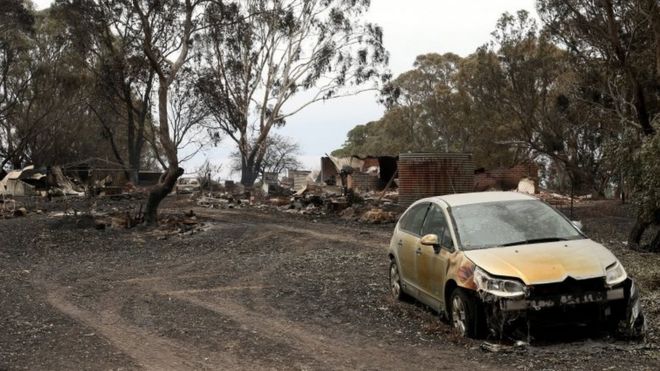
The fires razed scores of homes across two states on the weekend
SYDNEY, Dec 24 (NNN-AGENCIES) — Australian Prime Minister Scott Morrison rejected calls for “reckless” and “job-destroying” cuts to the country’s vast coal industry in the face of a deadly climate-fuelled bushfire crisis.
Morrison’s government has fiercely defended the lucrative coal industry in Australia, which produces a third of global coal exports and provides work in swing electoral districts.
“I am not going to write off the jobs of thousands of Australians by walking away from traditional industries,” Morrison told the Seven Network, in one of several morning interviews rejecting calls for further action.
“What we won’t do is engage in reckless and job-destroying and economy-crunching targets which are being sought,” he told Channel 9, responding to calls for more climate-friendly policies.
Holiday plans have been hit, with national parks closing camp sites and the main coastal road linking Sydney with southeastern beach towns again shuttered due to the impact of fires.
Conditions eased markedly on Monday, but authorities said in the last few days almost 200 homes have been damaged by fires in South Australia and New South Wales.
Authorities said little was left of the small town of Balmoral, southwest of Sydney.
Bushfires occur frequently in Australia, but scientists say several weather phenomena have come together to make this spring-summer bushfire season among the worst on record.
Record-low rainfall, record-high temperatures and strong winds have made the situation more combustible, and according to scientists, are influenced by climate change.
Morrison has insisted Australia will meet its 2030 emissions targets.
“I’m going to maintain the course of responsible management, responsibly addressing the changes of climate change and responsibly ensuring that we can grow our economy in what is a very tough climate at the moment,” Morrison told the Seven Network.
Australia committed at the 2015 UN climate summit to reduce its emissions by 26 to 28 per cent below 2005 levels by 2030.
While Australia’s national carbon emissions are low compared with major polluters, its fossil fuel exports – mostly coal – account for an estimated seven percent of the world’s carbon emissions. — NNN-AGENCIES
